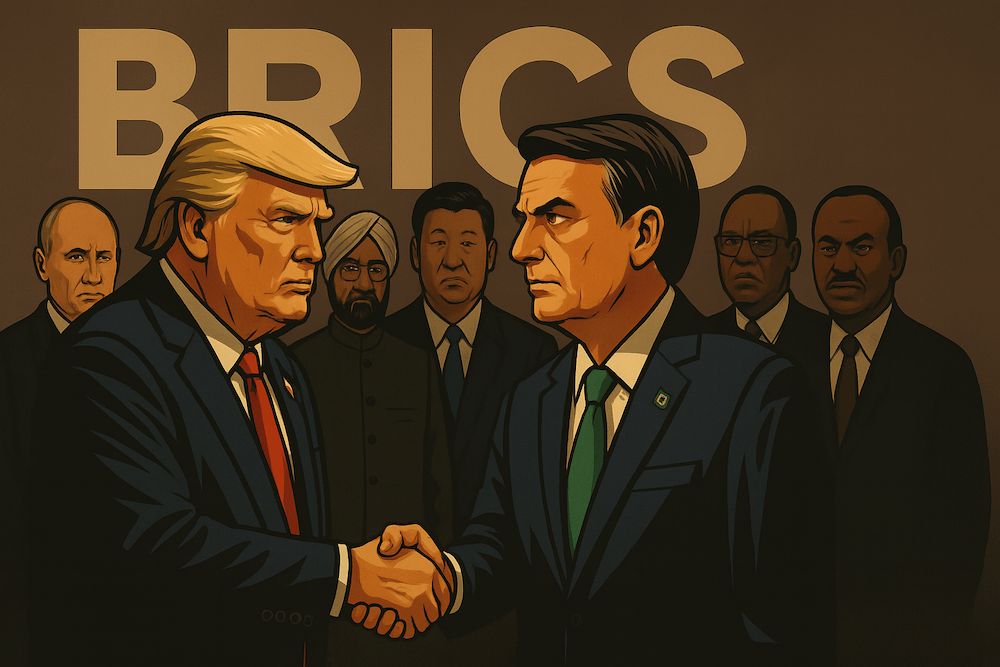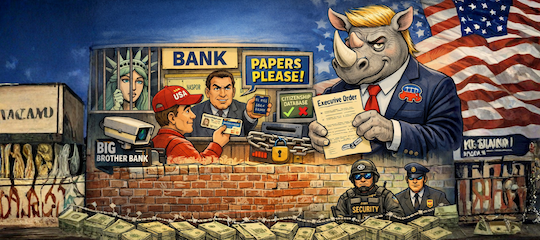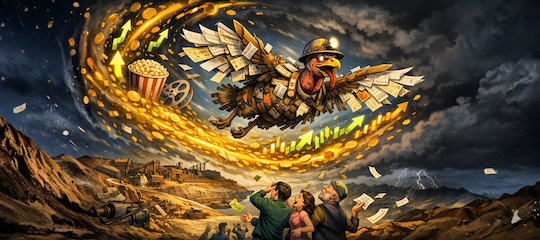
Posted July 10, 2025
By Sean Ring
Brazil Pays for Prosecuting Trump’s Buddy
Donald Trump doesn’t believe in half-measures. That’s what MAGA loves about him. He sees a wrong—he swings. And when he thinks an ally’s getting railroaded, he doesn’t wait for the State Department to noodle out a strategy. He acts.
So when Brazil decided to move ahead with what Trump views as a political witch hunt against former president Jair Bolsonaro, he acted.
Fifty percent tariffs on Brazilian goods. Boom. Just like that.
Of course, the media is howling. The diplomatic class is clutching pearls. The usual suspects are crying about “international norms.” But for Trump, this is simple: Bolsonaro stood with him. Now he’s returning the favor.
He’s sending a message: America protects its friends. If you’re an ally and you're getting politically persecuted, Trump won’t sit on his hands. Somewhere in the Great Beyond, Hosni Mubarak looks on bittersweetly, wishing Barack Obama felt this way in 2011.
But—there’s always a “but”—this latest power move is already making waves that go far beyond the U.S. and Brazil.
Let’s take a clear-eyed look at the logic behind it… and the risks we should keep an eye on.
Loyalty Has a Price
To Trump, the Bolsonaro prosecution reeks of the same politicized legal warfare he’s facing at home. The playbook remains the same: lawfare masquerading as justice. And in Brazil, the echoes of America’s January 6 narrative are obvious.
Lula’s government calls it accountability. Trump—and millions of others—see it as a power grab by the left, designed to kneecap political opposition by any means necessary.
So Trump isn’t just defending a friend. He’s drawing a line in the sand: “If they can do it to me, and they can do it to Jair, they can do it to anyone.”
This is about more than Brazil. It’s about setting a precedent—one that says political lawfare will come with economic consequences.
Whether you think that’s brilliant statecraft or dangerous overreach depends on your view of how strongly America should still lead the world.
A Strategic Gamble
Let’s not sugarcoat it. A 50% tariff is no joke.
Brazil is the U.S.’s second-largest trading partner in Latin America. We import everything from their soybeans and orange juice to steel and rare earths. Prices on some of those goods will rise. Supply chains will get squeezed.
And yes, retaliation is possible. Lula has already made noise about hitting back. After all, in his statement, Lula pointed out that the United States has enjoyed a trade surplus of more than $410 billion with Brazil over the past 15 years. So he’s got room to maneuver.
But Trump’s wager is simple: some short-term pain for greater long-term power.
If Brazil backs down, the message is clear—don’t mess with Washington, especially if you’re taking political prisoners. If Brazil retaliates? Trump’s fine with that, too. It just confirms his belief that Lula is no better than Maduro in Venezuela.
Either way, Trump gets to be the alpha on the global stage. That’s what he’s selling. That’s what his base expects.
The BRICS Blowback
Here’s where things get sticky.
The BRICS countries—Brazil, Russia, India, China, South Africa, and other member states—are closely monitoring all this. And predictably, they’re not pleased.
BRICS just put out another statement condemning what they call “unilateral economic aggression.” They’ve already been working on alternatives to SWIFT, to the U.S. dollar, to American trade routes. Trump’s move gives them ammo.
China and Russia are loving this. Not because they care about Bolsonaro, but because they want to fracture American dominance in trade and currency systems. And this tariff fight with Brazil? It helps them make their case.
Even India, which is usually closer to the West and is engaged in trade negotiations with the U.S., joined the condemnation.
What Trump Is Betting On
Trump doesn’t care about diplomatic cocktail parties. He cares about leverage.
He’s not trying to win hearts in Beijing or São Paulo. He’s trying to show American voters—and the world—that the U.S. isn’t afraid to punch back, even when it’s messy.
That’s what makes him popular. He doesn’t pretend. He acts.
In Trump’s mind, this isn’t about trade. It’s about justice.
The way he sees it, if the U.S. can sanction and pressure China, Iran, and Russia for violating human rights or (allegedly) rigging elections, why shouldn’t it take action when Brazil does the same?
Even if the globalists hate it, it’s consistent with Trump’s America First doctrine—just adapted for MAGA 2.0: protect your allies, punish your enemies, and don’t be afraid to use economic muscle to get the job done.
The Real Danger: Multipolar Acceleration
That said, let’s not be naïve. This could escalate into a full-blown trade conflict between the U.S. and the BRICS bloc. Trump has hinted that he might target any country that aligns with “anti-American” BRICS policies.
That’s a big list. And if it triggers a wave of currency de-dollarization or drives BRICS members to accelerate the development of a non-dollar trade network, that could hurt the U.S. much more than losing a few billion in Brazilian oranges.
Of course, BRICS members deny being anti-American. A Chinese think tank, the Shanghai Institutes of International Studies, published a report in March 2025 titled, “Decoding Greater BRICS Cooperation: A Non-Western Path to a Shared Development Community.” In the report, it reads:
Addressing the demand of developing countries for “non-Western” institutional arrangements serves as the primary impetus behind the ongoing expansion of “Greater BRICS Cooperation.” The platform’s membership, comprised of nations with relatively weak geopolitical identities, shapes its objective to promote “non-Western” institutional models that encourage inclusive development. The aim is to build a more just and equitable “post-Western” order, rather than evolving into an “anti-Western” geopolitical bloc.
Still, global investors are nervous. Aside from options traders, Wall Street generally dislikes volatility. Supply chains don’t love 50% price shocks. And other U.S. exporters—especially in agriculture and manufacturing—could get caught in the blowback if Brazil or others retaliate.
It’s a high-risk play. But Trump’s never been shy about betting big.
Summary Table: Trump’s Brazil Tariff Strategy
| Issue | Trump’s Objective | Risk | BRICS Response |
|---|---|---|---|
| 50% Tariff on Brazil | Punish Lula, protect Bolsonaro | Retaliation, inflation | Condemnation, call for alternatives |
| Tying Tariff to Bolsonaro Trial | Signal against political lawfare | Undermines norms, diplomatic heat | Rejection of U.S. interference |
| Threats to Other BRICS Members | Deter alignment with anti-U.S. blocs | Accelerated de-dollarization | Push for a multipolar trade system |
Wrap Up
Trump’s move isn’t irrational—it’s ideological. He’s laying the groundwork for a world where America doesn’t apologize for defending its allies, where justice and loyalty matter more than the approval of foreign bureaucrats.
But every strongman move comes with a cost. The question is whether Trump’s base—and America’s economic system—are ready to pay it.
For now, the world is watching. Brazil is bracing.
And Trump? He’s just getting warmed up.

The Biggest RINO of Them All
Posted February 27, 2026
By Sean Ring

Sports, Predictions, and Morons
Posted February 26, 2026
By Sean Ring

SOTU or STFU?
Posted February 25, 2026
By Sean Ring

Building an AI-Proof Portfolio
Posted February 24, 2026
By Sean Ring

Beware of Flying Turkeys
Posted February 23, 2026
By Matt Badiali

